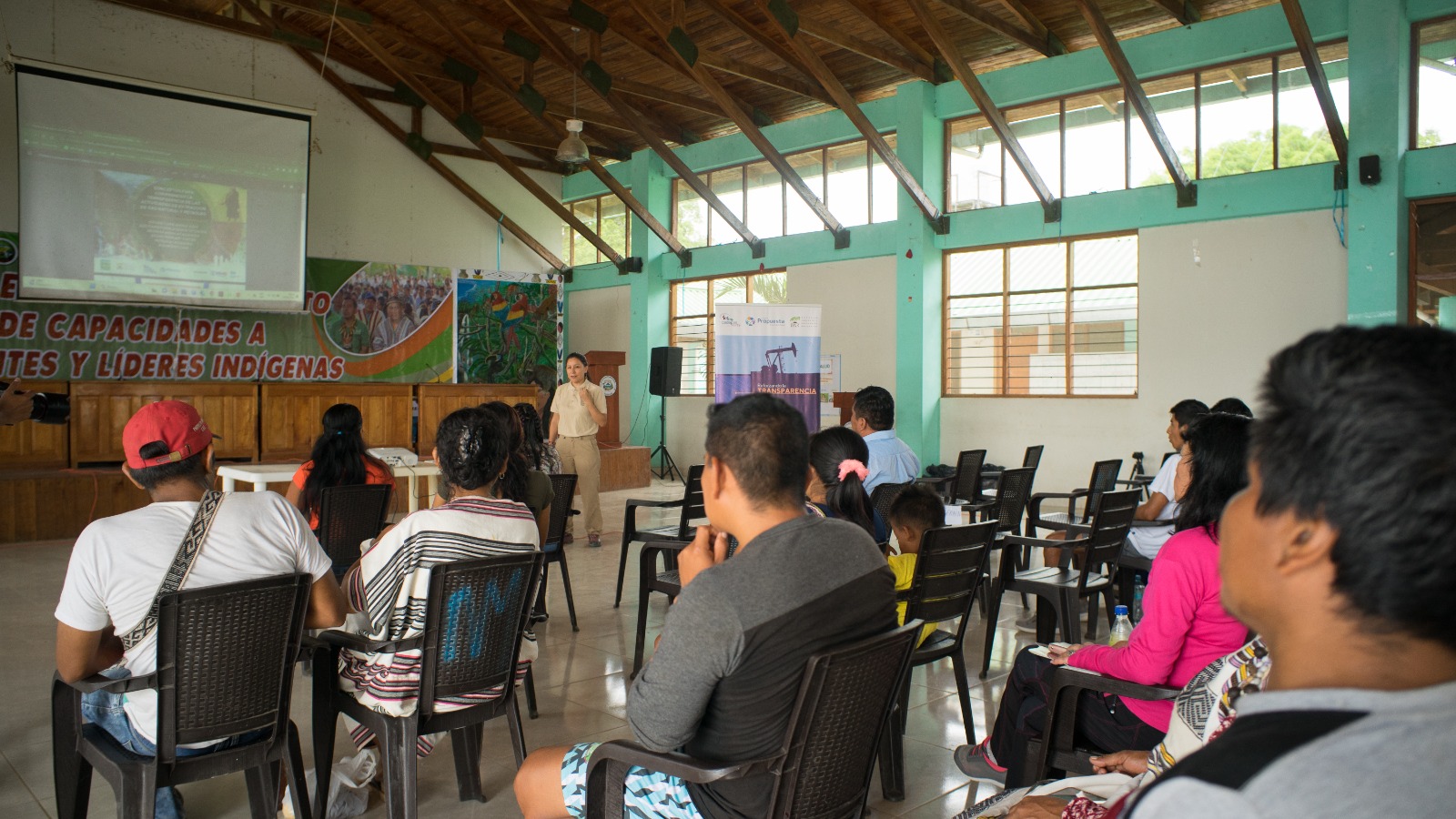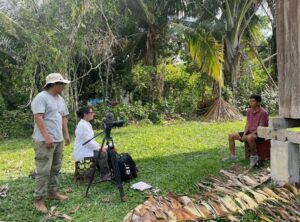
Denisse Linares works as the Sustainability Program Project Leader at Derecho, Ambiente y Recursos Naturales (DAR) in Peru. Denisse shares her learning journey and what inspires her, along with the important work DAR does in the field of land and environmental justice.
Ever since I was very young, I have always loved being with nature. That’s the first thing I can think of when answering this question. Later on, as an adult, I came to think that we are all part of this system – of nature. We’re not in the center of life. Nowadays, I think that humanity is not aware of that. The majority think that we are outside of nature – of this cycle of life that exists. This has been my principle working in this field. I want my family, friends, and colleagues to be aware of that.
“But what we are doing now to nature and the environment? We’re destroying it. We need more people to be aware of the importance of nature so we can ultimately save ourselves.”
And for this reason, we need to be careful. We need to be very aware because nature also works for us. For other people, this may seem obvious, while for others, it may not. For example, in the cities, we are not aware of the importance of trees. Most of the time, we only know that we need a lot of parks and landscapes for our mental health. When people are sick, some medics even tell us to be with nature because it’s a cure – not only physically but also spiritually and mentally.
I’ve had several travels to the communities in Peru, in the Amazon, that have very beautiful landscapes. Indigenous Peoples there who live very differently from people in the cities. I travelled and worked in this region, and I am very grateful to have this kind of work.
One experience I had was when I travelled to the city of Cusco in Peru, in the Amazon region. When I traveled there, I was very impressed: you have to go there via boat for eight hours with very strong currents. The trip to Cuzco in the Amazon region is by river. It is a different river from the rivers of the East. When you travel to the rivers in the East, they are quite calm. You can sleep and be calm. But the trips to Cuzco Amazonia are very fast-flowing rivers with whirlpools that the boat can go churning into the water.

Denisse facilitating an interview.
I traveled with some indigenous leaders who told me that I had to be very respectful, because accidents do happen. So when I arrived at the community I noticed that there was not much exchange with other towns or with the city because of the difficult access. But it was so well preserved that they had created their own system for the conservation of the forest and residues.
So they told me that they did need to connect with other towns, for example, through a more fluid road or airplane tracks. However, they were also afraid that this connection would bring them other “city evils” such as crime, illicit activities, and the rape of women, problems they do not see in their communities.
So yes, I was quite surprised by that. Now I know more about it, but this experience is from when I traveled five or six years ago. I understood that it is not only a myth when we are told here in the city that we have a real impact on the communities, but that they think so.
So I confirmed it with them. There was something that stuck with me, they told me several stories of how they got there. The towns in “voluntary isolation” in Cuzco, and many others across Peru.
And one of them told me that they were not necessarily in “voluntary isolation” because they had chosen to be, but because throughout their history they have suffered different occupations. First, when the Spanish invasion came to Peru, they had to retreat to the most remote communities where they would not be found. And where I tell you that the part of the largest river that no one can enter, the Spaniards could not enter either, is what they tell us, and they were able to hide.
Then came the rubber tappers or the rubber industry, which here in Peru was a disgrace because it enslaved the native peoples and the same happened to them. They had to hide. One of those people was the mother of the leader who was talking to me at the time, who had to hide with her whole family deep in the forest, but she did not want to remain isolated, so she had her children go to the nearest community called Timpía.
The leader started to study, read, and write Spanish. He also speaks, Mashiguenga, and then he became an indigenous leader. And now comes another type of occupation, mining, deforestation, and they are always suffering occupations. It is a constant that they live and it does not stop.
Currently, they are also living, not with the same characteristics, but it is something systematic. We keep thinking that these territories are unoccupied and that they only serve to extract resources. In reality, they are occupied territories, living territories from which we must learn to improve our quality of life in the city.
Yes, and it’s harder for indigenous peoples. Sometimes there are moments of disappointment or sadness, or maybe there are moments when we can get discouraged by the constant negligence or intransigence of the government, right? And I say this because I have little experience compared to other people, I have been working here in DAR for eight years. In all this time we have tried in some way to improve some types of norms, and policies to improve the quality of life of the indigenous peoples and to preserve and protect nature on this side of the Amazon.
“I am an NGO worker and I am also a Peruvian citizen, but I think the ones who are most at risk are the Indigenous Peoples.”
But there is an enormous capacity of companies and other actors, which are generally more enormous because they have money and power, that end up winning many battles to appropriate territories, to intensify the exploitation of some areas, without taking into account that they are also putting at risk, not only the indigenous peoples or the Amazon but in general all the ecosystem services that we provide, in the cities as well. So, what motivates me to stay in this life choice, in this work choice? On the one hand, it is the struggle to be aware that we cannot maintain this system, this system of extraction and appropriation of natural resources and exploitation of rights. I know that it is quite general and that maybe we won’t see it ourselves.
You just mentioned it, we have living conditions in insecurity, that insecurity has reached the communities, where there is no State, where there are no institutions to protect them, where nature and the best living conditions have been elitized because to live well you have to be close to people or social groups with greater economic power. Because we could have an excellent life in the communities, because we have all the environmental conditions with which we could live, but we won’t. There is a total neglect by the State here in Peru, in the communities, which does not allow us to have a quality life.
“I believe that even if I might not witness all the changes, it’s important not to simply stand by and watch life pass us by. Remaining silent about issues we know are wrong would be worse than taking action and doing what’s right. This isn’t about winners or losers, but about the urgent need for improved living conditions in Latin America.”
Contaminated water, land disputes, environmental conflicts, water conflicts, now there are illegal activities such as drug trafficking that are besieging and cornering through the indigenous peoples. So at some point, this is going to affect the whole country, and the whole region is being affected. We cannot remain with our arms crossed and watch all this happen, at least from my point of view we have to contribute to reverse and change this situation. Even if it is a long road.